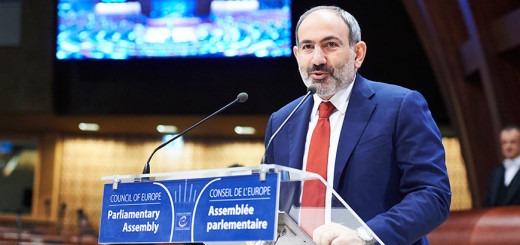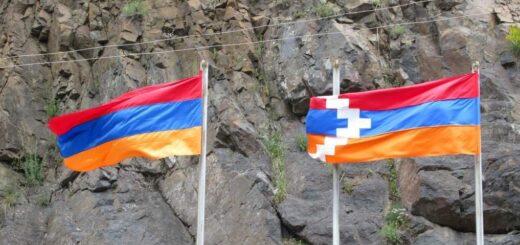Pashinyan Made Yet Another Gaffe, Implying that Shushi Was an Azeri City
After ruling Armenia as Prime Minister for almost three years and most importantly during the country’s recent disastrous defeat in the Artsakh War, Nikol Pashinyan keeps making mistake after mistake and misstatement after misstatement.
As I have written before, regrettably Pashinyan is not competent to lead Armenia. He is more of a protester and a critic, who does not possess the necessary skills and experience to be the head of state. The Artsakh War made the situation in the country even worse and exposed Pashinyan’s inability to manage the plethora of Armenia’s problems.
Armenians around the world had high hopes that, after getting rid of the previous regime, Pashinyan would be able to lead Armenia into prosperity and a degree a normalcy. The overwhelming majority of Armenians supported him due to their complete hostility to the former government.
Unfortunately, it turned out that Pashinyan was all talk and no action. In addition to his lack of experience, he surrounded himself with advisors and ministers who knew even less than he did. As a result, neither he nor his government had the slightest chance to be successful. The Artsakh War made matters worse. As the Commander-in-Chief, he made error after error leading Armenia and Artsakh to an indescribable disaster from which we will not recover for decades, if ever. Pashinyan now insists that he should remain in power to correct the grave problems of the country. One would be extremely naïve to believe in such a promise. A leader who is incompetent to lead in peace time and utterly fails during the war is in no position to correct anything. He has made matters worse with his misstatements and erroneous policies.
Several weeks ago, while addressing the Parliament, Pashinyan angeredmany Armenians by describing as “unfortunate and pale” the historic Armenian city of Shushi in Artsakh. There was no reason to use such negative adjectives to describe a city which is the pride of all Armenians.
More recently, during another appearance in Parliament, in response to a question from a deputy about Shushi, Pashinyan made matters worse for himself, when he said: “Shushi before the conflict and the liberation [in 1992], had an Azeri population of 90 and more percent. In other words, you mean to say that the city of Shushi with an Azeri population of 90 and more percent is Armenian with that status?”
A huge outcry erupted among Armenians around the world after Pashinyan’s unfortunate words. This was yet another self-inflicted wound. A few days later, during Pashinyan’s visit to Yeraplour, the cemetery where fallen Armenian soldiers are buried, when a journalist questioned him about his statement in Parliament on Shushi, he said that he would give an answer if the reporter put her question in writing. The following day, the journalist wrote Pashinyan’s words on a large placard and read them aloud, while standing in front of the Prime Minister’s building. Even though one of Pashinyan’s supporters attacked the journalist and tore up her placard, the Prime Minister kept his word and on his Facebook page addressed the controversy during a live video.
In his response, Pashinyan first accused the media of manipulating his words. He repeated that in the early 1990’s Azeris consisted of over 90 percent or rather 96 percent of Shushi residents. He went on to state: “How Shushi could be considered under Armenian control by its status when 96 percent of the population was Azerbaijani?” Pashinyan then mentioned the offer by Azerbaijan’s President Ilham Aliyev on October 19, 2020, several weeks before the end of the war, to accept Armenia’s demand for a ceasefire on condition that Armenians allow the return of the former Azeri residents to Shushi, under Armenian rule.
Pashinyan made several errors in his original statement and subsequent failed attempt to set the record straight. Actually, he had no reason to go into such a convoluted and false argument. He had just to say that he rejected Aliyev’s offer because allowing Azeris to return to Shushi under Armenian control was unacceptable to him and most Armenians. In fact, that’s exactly what Pashinyan told the President of Russia, Vladimir Putin, when the latter relayed to him Aliyev’s offer. Had Pashinyan limited his remarks to that fact, there would have been no outcry in the Armenian world. There was no reason to say that Shushi was mostly populated by Azeris prior to 1992, causing such a controversy at a time when his power is waning and he is criticized by a lot of Armenians, including many of his former supporters.
By mentioning the high percentage of Azeris living in Shushi in the past, Pashinyan made several mistakes:
First of all, regardless of the number of Azeris who lived in Shushi, it is a well-known fact that it has been an Armenian city for centuries long before Azerbaijan existed. In 1920, after Azeris massacred thousands of Armenians in Shushi and pursued a policy to depopulate the city’s Armenians, their numbers were diminished considerably. But Pashinyan provided no such background in his misleading statement.
Secondly, Pashinyan was wrong to judge whether an area is Armenian or not by its population at a particular time. For example, there are hardly any Armenians now living in Nakhichevan or Western Armenia, but Armenians still consider these territories to be a part of historic Armenia.
Thirdly, it is understandable that accepting Aliyev’s offer to allow former Azeri residents to return to Shushi, under Armenian control, was a hard pill to swallow for Pashinyan and most Armenians, there is an important issue to consider. How many Azeris would have returned to Shushi to live under Armenian rule? Very few, if any. Pashinyan’s implication that thousands of Azeris would have returned to Shushi, making the city’s population again 96% Azeri was totally unrealistic. No Azeri would have wanted to live in Shushi under Armenian rule, just like no Armenian would risk living in territories controlled by Azerbaijan.
Finally, Pashinyan’s refusal to accept Aliyev’s offer on October 19, 2020, meant that the war was prolonged until November 9, 2020, causing the loss of much more Armenian territories to Azerbaijan. Furthermore, Azeris took over Shushi completely and many more young Armenian soldiers were killed or wounded. The consequences of Pashinyan’s faulty decisions during the war were far worse than his misstatement in Parliament and his subsequent lame effort to correct himself.
The Prime Minister should realize that the longer he clings to power, the more he destabilizes the country. A defeated and incompetent leader cannot improve the tragic situation in the country. The sooner he leaves, the faster a new government can take over and try to reduce the damages suffered by Armenia and Artsakh







